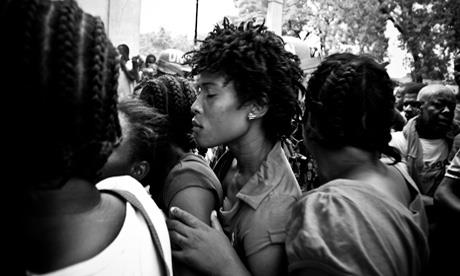International Women’s Day: FAO, WFP and IFAD honour Haitian women
Rome-based UN agencies FAO, World Food Programme (WFP) and the International Fund for Agricultural Development (IFAD) marked International Women’s Day by pledging to help women affected by the Haiti earthquake make the challenging transition from emergenc

© WFP/M. Frattini
8 March 2010, Rome – In keeping with the UN theme for this year’s International Women’s Day, “Equal rights, equal opportunities: Progress for all,” the event at WFP headquarters was held in memory of three prominent women’s rights activists who lost their lives during the earthquake - Anne Marie Coriolan, Myriam Merlet and Magalie Marcelin.
FAO Assistant Director-General Annika Söder, IFAD Chief Finance and Administration Officer Jessie Mabutas, and WFP Deputy Executive Director Gina Casar said the three agencies would use their combined resources and expertise to support the government of Haiti and other partners in the country’s rehabilitation, and to help women overcome the challenges they would face in the months and years to come.
Emergency, gender and rural development experts from the three agencies who have been directly involved in quake-recovery efforts in Haiti lauded the resilience of Haitian women, but said they would need well-focused support to boost their long-term resistance to crises.
Dick Trenchard, FAO Assessments Coordinator for Haiti said that in order to provide effective support to affected households, it would be important not only to look at the number of households in need of assistance but also, to take into account how women might be affected differently from men.
“When we deliver support, we need to make sure we have a full understanding of what is going on at the intra-household or sub-household level,” Trenchard commented before the event.
“Specifically, we need to take a close look at how the capacity of the family to cope has an impact on the different members of the household and how their individual situations will affect the household as a whole,” Trenchard said.
Women in developing countries, especially female-headed households, often are hard hit by natural disasters like the recent temblors in Haiti and Chile, and other crises, in part due to social and economic inequalities between men and women which leave them with fewer resources to cope with emergencies.
Women tend to lag well behind men in their access to the basic means necessary to produce or purchase food and earn sufficient income. This, in turn, undermines the long-term resilience of entire households and communities.
An estimated 500 000 people have migrated to rural areas and other smaller urban centres, since the earthquake. Many of them are staying with relatives and friends who are spending their limited savings and consuming food stocks to feed the new arrivals.
Trenchard said that it was believed that many men would soon be ready to head back to urban areas to take part in construction work. This was expected to leave many women behind, leaving them with more household responsibilities, yet fewer resources.
“So, instead of one man, one woman and three kids to a household, for example, we might see one man, three women and five or more kids,” he added, along with “a lot more female-headed households in rural areas.”
Preparing for the planting season
In February, the three United Nations Rome-based agencies established a Task Force for Food Security in Haiti. The Task Force is supporting the government of Haiti in the implementation of a concerted, coherent and targeted, immediate and longer-term food security strategy that integrates agricultural production, and social safety nets.
The agencies are working with the international humanitarian organization CARE on a wide range of emergency rehabilitation activities, including providing shelter, emergency supplies, water and sanitation facilities and health support for mothers and pregnant women.
FAO is also laying the groundwork for agricultural and rural development activities. As the planting season gets underway, FAO is supporting small scale farmers with essential agricultural inputs such as quality seeds and tools. The Organization is also focusing on alternative income opportunities, such as a cash-for-work programme to clean out irrigation canals in Léogâne, a farming town to the west of Port-au Prince that was 80 percent destroyed by the earthquake.
Media contact ![]()
Charmaine Wilkerson (Rome)
(+39) 06 570 56302
[email protected]
